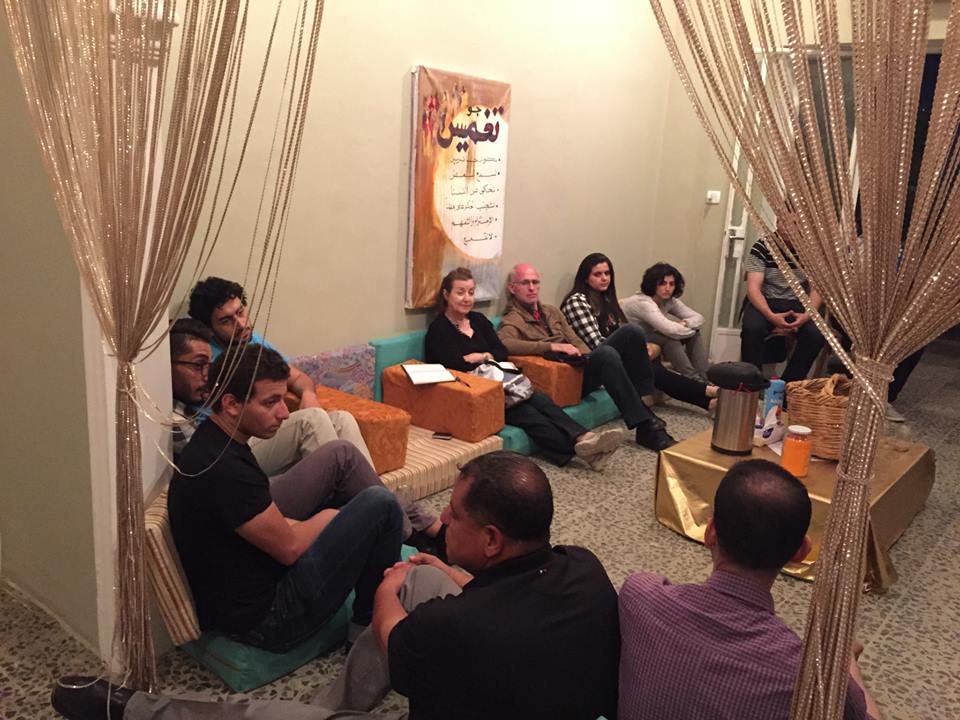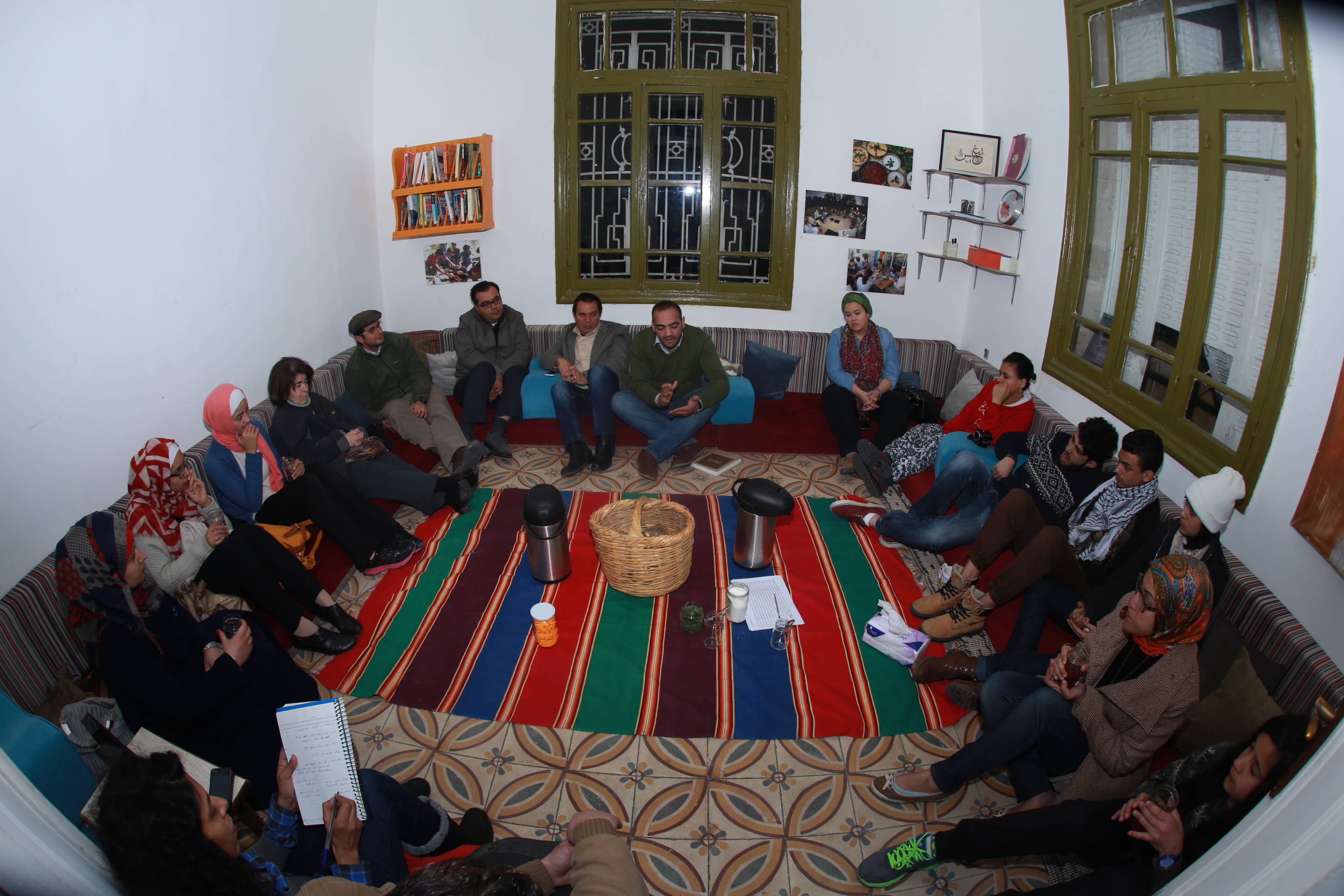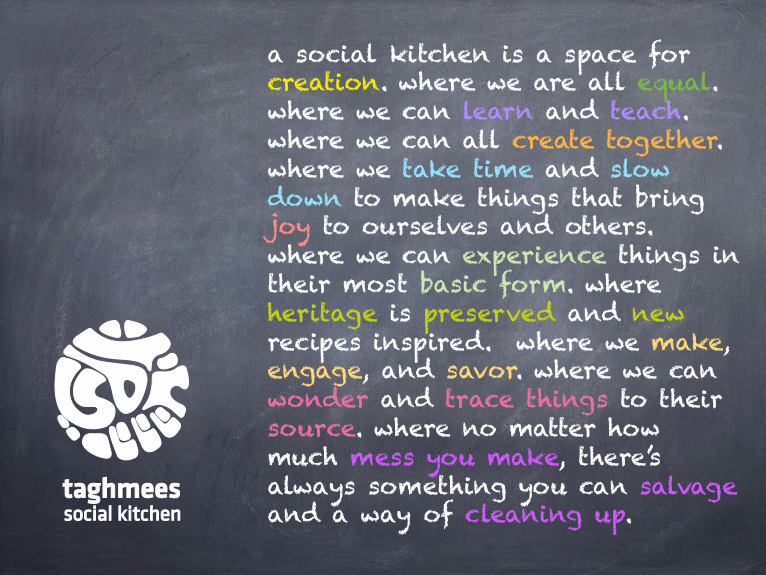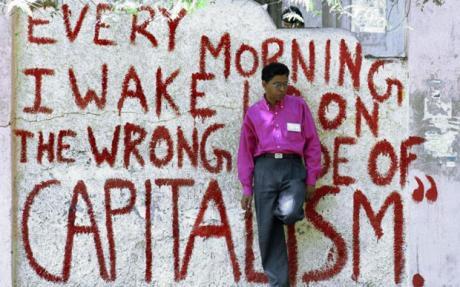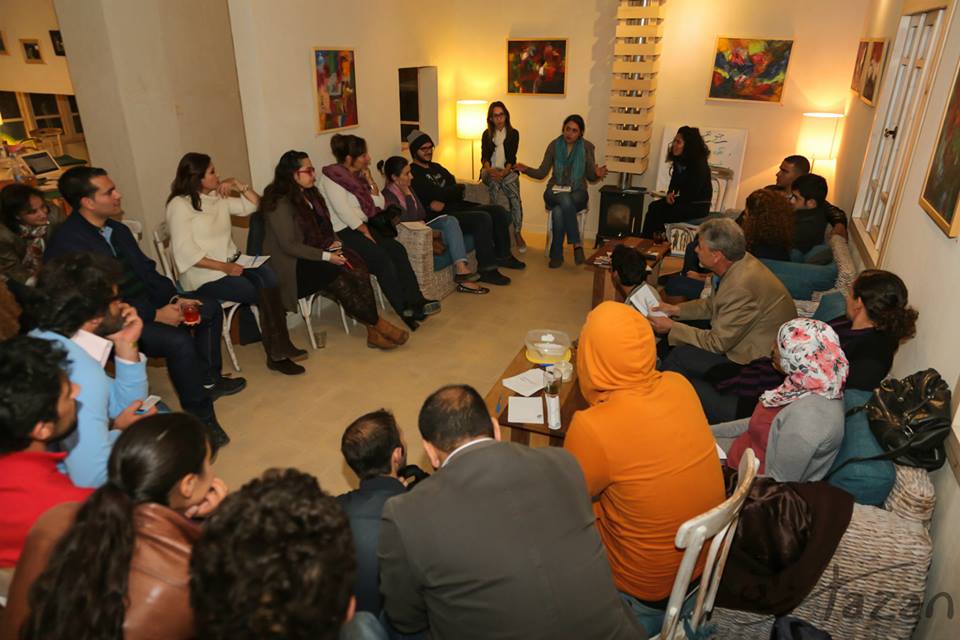
ان نعيش جو تغميس في كل لحظة من حياتنا ساعدنا على ان نرى فرص التعلم المحيطة بنا، وبان نكون حاضرين بالعالم من حولنا، مهارة نحاول ان نعززها بدواخلنا لنستمتع بالتغميس بالتنوع الهائل بالناس والأماكن والتجارب. كلما انغمسنا أكثر كلما اكتشفنا الثراء الذي يتسلل الى أرواحنا ويغذيها بالمعاني والمعرفة والحكمة فقط بمجرد وجودنا بقرب بعض كل يوم. مع هذا الغنى بدأت نبته صغيرة تنمو وتكبر بسرعة، تتساءل عن التعليم ولماذا هو حاضر في حياتنا بشكله الحالي ومصمم بطريقة يجعلة غير متاح للجميع ويقيدنا بنوع وطريقة الحصول على المعرفة.
بمجرد اكتشافنا لقيمة التعلم خارج اطار المؤسسات التعليمية، شعرنا بأهمية مشاركة هذا الكنز المحيط بنا، وبالتعاون مع “تبادل” انخرطنا بفرصة للتعلم خارج اطار المؤسسات التعليمية. في جلستنا مع “تبادل” بدأنا نقاشنا بطرح سؤالين: ما هو التعليم؟ وما هدف التعليم؟
في نقاشنا دخلنا في دوامة ايجاد معنى للكلمات والتمييز ما بين التعليم والتعلم وفي نفس الوقت لمسنا الفرق في استخدام الكلمات بين العربية والانجليزية وكيف ان المعنى الدخيل لكلمة تعليم (اديوكاشين) جاء ليحل محل المعنى الأصلي لها في لغتنا (teaching) العربية
التعليم بمعناه الحديث هو شيء نستطيع الحصول عليه والوصول اليه فقط عن طريق الشهادات والمؤسسات والإمتحانات والمعرفة الجاهزة وأشخاص مرخصين لنقل المعلومة، كل هذه العناصر تشكل تربة خصبة للتفرقة وعدم العدالة وتفضيل أشخاص على أشخاص وبالتالي تفرز وتأهل أشخاصا يخرجوا الى حقل العمل ليزيدوا من الانتاجية والاستهلاكية.
المعرفة بدها تغميس، وكلما انغمسنا أكثر كلما انتقلنا من فكرة الى أخرى لنبني على هذه المعرفة. انتقلنا في افكارنا الى تعريف من هو “الشخص المتعلم” في مجتمعنا. ولنفهم هذا قمنا بطرح مثال لبدوي عربي أصيل يقوم بتربية أغنامه وحياكة الصوف والتنقل من مكان الى آخر كل موسم، يعيش حياه غنية بالمعرفة التي اكتسبها من أجداده. سألنا هل يعتبر هذا البدوي متعلم أم لا؟
مرة أخرى دخلنا في متاهة معاني الكلمات، والتناقض بين كمية المعرفة التي لا تقدر بثمن الموجودة عند البدوي وفي نفس الوقت الرضوخ للمعايير المحيطة بنا والمزروعة بدواخلنا عن معنى التعليم في عالمنا الحالي. كيف لنا أن نصدر أحكامنا على شخص لديه من المعرفة العميقة وبتفاصيلها الدقيقة وبطريقة عيش حافظت على أجيال ورا أجيال لمئات بل آلاف السنين حتى قبل ظهور فكرة التعليم بانه غير متعلم؟ هذا التناقض قد لا يحل الا بعمل ثورة على معاني الكلمات وايضا بان نكون شركاء في تكوين المعنى لكلمة تعليم والعودة بها الى بيئتنا دون مقارنتها بأي مرادفات غربية.
حسب التعريف الدارج لمعنى التعليم يطلق على هذا البدوي بانه غير متعلم، فقط لان معرفته لم تتطابق والمعايير المؤسسية المطلوبة ولم يقوم فريق من الخبراء باختبار معرفته وباعطائه علامة النجاح وشهادة المعرفة. اذا حصرنا التعليم بكل ما تفرزه المدارس والكليات والجامعات وبقيت كلمة متعلم احتكارا على كل من يجلس على كرسي الدراسة لسنوات عديدة داخل جدران هذه المؤسسات بغض النظر اذا كان قد تعلم ام لا، اذا فلن يكون هناك أي قيمة تعطى للمعرفة المكتسبة من الحياة وسوف نستمر في النظر للمعرفة من منظار واحد فقط، فنصبح وبطريقة ممنهجة على العمل بالتقليل من أهمية أي وسيلة تعليمية أخرى وأيضا بتهميش أي معرفة أخرى نكتسبها في حياتنا.
نقاشاتنا عرفتنا على أفكار ومفاهيم عديدة، يمكنكم الاطلاع عليها من خلال زيارة موقع الملتقى التربوي العربي
كل الشكر لرانيا الترك لدعوتنا لنكون جزءا من تبادل وكل الشكر لكل من كان حاضرا وشاركنا فرصة التعلم.
For us, living Taghmees allows us to find learning in every moment of our lives, simply by engaging consciously in the world and immersing ourselves in a diversity of people, places, and experiences. Our constant realization of the abundant richness in meaning, knowledge, and wisdom that comes from everyday living has us questioning why education is designed in way that is necessarily restrictive, inaccessible, and scarce.
Having found deep value for learning outside of education and institutions, we were excited to share conversation around this topic in Tabadul Open Forum, as a way of engaging in learning outside of institutions. We began our conversation by asking two questions: what is education? and what is the purpose of education?
Through discussion we struggled through definitions, differentiating between words such as ‘education’ and ‘learning’ (while recognizing that in Arabic, the foreign concept of ‘education’ has come to supplant the original meaning of the Arabic word for ‘teaching’).
‘Education’ is something we can only get through certain institutions, consisting of tests, certificates, pre-packaged knowledge, and certified knowledge-holders, all creating fertile ground for separation, inequality and privilege, while pumping out mechanized workers to continue feeding the modern machine. Whereas ‘learning’ is as natural as breathing, walking, loving, and being – to be human is to learn, at no point in our lives does this cease to be true. As with learning, the stated intention of education is increased competency (knowledge, skills, attitudes, behaviors, language, and awareness) towards a better life and generally being better people.
Building on these thoughts, we moved on to explore how we as a society define an “educated person”. Looking at the example of a Bedouin raising sheep, weaving wool, moving with the seasons, living a life rich in the knowledge of his ancestors, as learned by his fathers and forefathers; we asked whether or not this Bedouin would be considered educated?
Again we struggled against definitions, seeing the invaluable depth of his knowledge, while unable to resign ourselves to normalized standards of ‘education’ and what it means to be ‘educated’ in today’s world. How can we label a person holding the intricate knowledge and experience of a way of life that has sustained generations upon generations of our people for thousands of years, before the concept of education even existed, uneducated? The contradiction is difficult to negotiate without redefining the meaning of ‘education’ to resemble that of ‘learning’.
By common definitions, he is deemed ‘uneducated’ for failure of meeting institutionalized standards and having his knowledge certified by a board of recognized experts. As long as ‘education’ is restricted to that which emerges from schools, colleges, and universities – and the term ‘educated’ reserved for those that have spent years confined within the closed walls of these institutions, regardless of whether or not they learned anything – then no amount of knowledge gained from life and living is recognized within this framework, systemically undermining all other forms of knowledge and knowing.
Our conversation introduced us to many concepts and ideas, and some that you can explore online are Changing Education Paradigms by Ken Robinson, and articles by Munir Fasheh.
Our thanks to Rania Turk for inviting us to be a part of Tabadul Open Forum, and to everyone who was there to share this space of learning.

